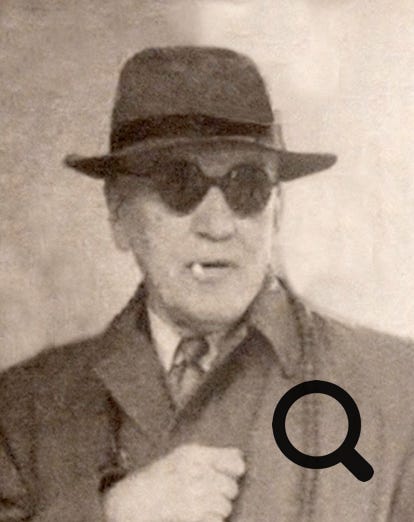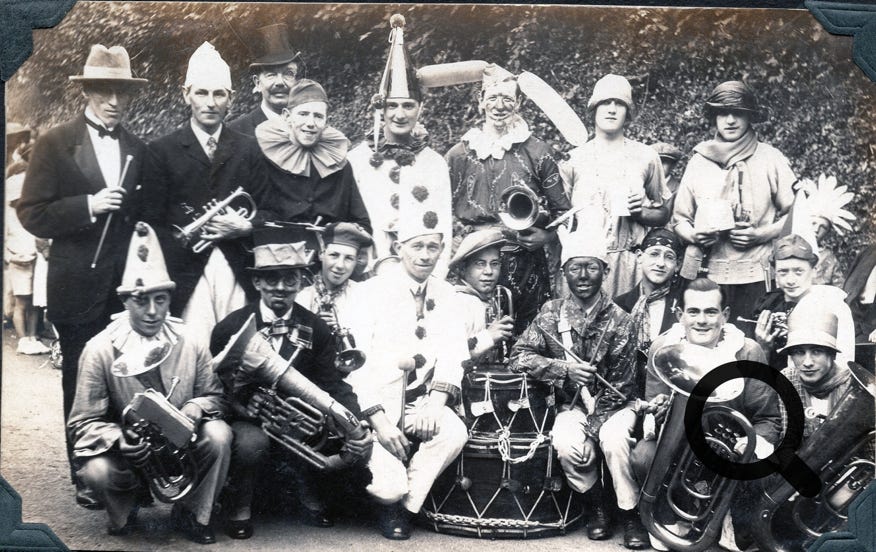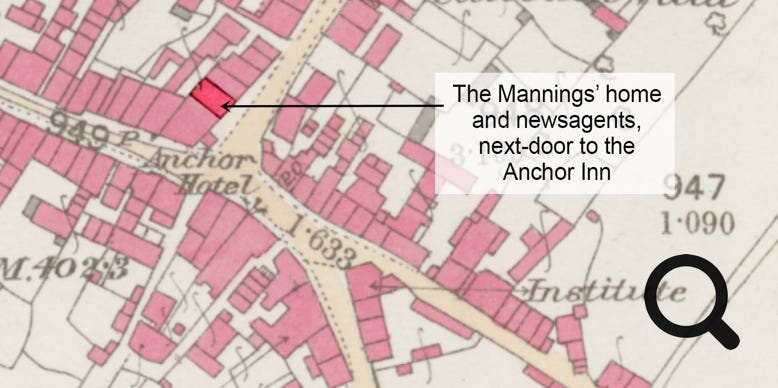Lily Style Author
The Blind Pianist of South Brent
Arthur Manning is still remembered in South Brent for leading singalongs in the Anchor Inn, and his rigid control of mischievous choirboys, despite being blind.
Who was this characterful, blind pianist whose memory is still alive?
Records reveal that he was born in South Brent during the reign of Queen Victoria, and local memories flesh him out as an indomitable character whose family ran a paper shop and owned a dog named Scamp, or Scampy.
Recollections of Arthur Manning from members of South Brent Archive’s Facebook group
Doug Langdon: Arthur Manning was the organist at St Petroc’s Church when l was a child in the 1950's. Although my brothers and l were not members of the Church, he recruited us to sing in the choir at one of their Easter services. He was not only an accomplished musician, he was also an amazing choirmaster.
He used to play the piano one handed and conduct with the other. Gerald, Bernard and l were only invited guests, so we were well behaved!!
His musical talents also included sing songs in the Anchor!!
He was a biggish man and he wore dark glasses. I also remember him or his family having a little white terrier called Scampy.
Avril Kerswell: Yes, you’ve summed up Arthur very well. He was a lovely man… his family had the paper shop next door to The Anchor. Didn’t he have daughters? Or was it his wife who ran the shop?
Ted Westcott: Arthur Manning was an exceptional musician well-loved in South Brent. I was in St Petroc’s choir and got to work with him for several years. Choir practice was in the church on Tuesday eves. He had a small piano in front of the pew by the organ. We would rehearse the chosen psalms and hymns for the services, plus there was always an anthem for Easter and Christmas. Carols at Christmas involved some solo verses for us. We were a bit naughty, as all youngsters can be, and used to take advantage of his blindness to wander during practice. However, he had honed his hearing and senses to know exactly what was going on. Very strict and always had control despite his blindness.
Marilyn Bullen: It was his sisters that ran the paper shop, and Scamp the dog belonged to the Manning that lived in Mons Terrace. They had a daughter called Stella. I don't think Arthur was married. My dad, Eric Burrows, also played the piano in The Anchor for Bill Martin.
Doug Langdon: I have a feeling it was his sister, and possibly his niece, who may have lived at Mons Terrace, who ran the shop. The niece had a slight mobility issue.
Local historian, Greg Wall, provides another description of Arthur Manning in his memoirs of his 1950s childhood, published in South Brent newsletter in 2005:
Many of the men who used to stand on Anchor corner lived in Church Street or Wellington Square. Jimmy Garland, Bill Endacott, John Scott, "Jack" Hard could be found watching the goings on in the "Square" as well as, of course, Arthur Manning, Brent's famous blind organist. At various times during the day he would make his way down to the Church, feeling his way along the edge of the pavement with his white stick or holding the shoulder of one of the others to practice or just sit.
Arthur Manning in records
The pre-World War II 1939 Register gives Arthur Manning’s birthdate as 9th January 1889. The 1891 census shows him as a two-year old living in an unspecified cottage on Church Street, South Brent, with six older siblings and their parents, Emma and William H. Manning, who was a railway worker.
Parish records reveal that Arthur’s parents, William Henry Manning and Emma Patton, married in St Petroc’s, South Brent, in the summer of 1871. Their first child, named Emma for the mother, was baptised in St Petroc’s on 27th July, 1873. Arthur was their last-born.
No records have come to light about when Arthur became blind. If he was blind from birth, it isn’t noted in the disability column of the 1891 census. Nor in the 1901 and 1911 censuses. He did, however, attend South Brent Board School, so it seems likely he was sighted as a child. He didn’t serve in World War One, suggesting he was exempt from service. The first record linking him to blindness is a 1936 Western Times report of a “blind social” he organised in South Brent’s Royal Oak pub (now the Station House).
Arthur Manning made it into the press on 28th December 1901, when Totnes Weekly Times included him in a list of boys who won prizes for good attendance at South Brent Board School. Then, on 4th February 1905, Exeter and Plymouth Gazette tell us that Arthur and two brothers, Charles and Alfred, sang at the 11th annual supper of the employees of the Great Western Railway. Their father, W, Manning, is named as a ‘ganger’ (foreman). The ‘party broke up at 2 a. m.’
A few months later, sixteen-year-old Arthur Manning joined the Misses Hard and Gregor to contribute music to a jumble sale to raise money for South Brent Nursing Association (Western Morning News, 13th April 1905).
The photo of the pierrot troupe below shows Arthur Manning (bottom right) with drifting eyes, suggesting he may have already been blind.
A lifetime of entertaining
Dartmoor Resource quotes a 1997 letter from the archivist of the South Brent Amateur Dramatic Society, Maggie Taylor:
‘Through all the years between 1907 and the end of World War Two, the village showbiz scene was dominated by one particular person. He was Mr Arthur Manning, a professional pianist and later the leader of his own dance band, as well as the organist and choirmaster of St Petroc’s Church. He was involved in almost all the village entertainments, produced and devised most of the concerts, was a co-founder of the Pierrot Troupe and was responsible for both the Quadrille Band (formed I think in 1919) and the Brent Brass Band which he founded and trained in 1924. It was also Arthur Manning who founded and ran the village’s first amateur drama group of which, in spite of being nearly blind, he was also the resident producer.’
He’s mentioned in the report of another Nursing Association fundraiser, which took place in Millswood Hall on New Year’s Eve 1908-9. This time, now aged nineteen, he was co-organiser and an active, dancing member of South Brent’s pierrot troupe. According to Totnes Weekly Times:
A highly successful entertainment, followed by a dance, arranged by Messrs. Arthur Manning and W. Arthur Winter, was held in the Millswood Hall, on New Year’s eve, and the proceeds of which are to be given to South Brent and District Nursing Association. The hall was kindly lent by Mr. W. H. Hawke. The entertainment opened with a selection by the orchestra, which consisted of Miss E. Hard, piano ; Misses. F. Doddridge and C. Gill, 1st violins ; and Miss E. Tope, and Mr. E. W. Hull, 2nd violins. Then came songs by Messrs. W. H. Nugent, and R. H. Tucker, of Totnes, a humorous duet byMessrs. Arthur Manning W. Arthur Winter, and a violin solo by Mr. F. Doddridge, all of which were well received. After this came the feature of the evening, the Pierrot troupe, the members of which were Mr Bewsey, who sat as centre piece nursing two pups, which caused great applause, and Messrs. Arthur Manning, H. Gay, Alec. Smith, J. Hard, W. Pinhey, and W. Arthur Winter. The troupe delighted the audience as they ably performed their dances, jokes, songs, duets, etc…
The photo above (first published in ‘South Brent and Its People Remembered' by Greg Wall) is from a series by W. R. Gay showing the pierrot concert troupe who performed in Millswood Hall on News Year’s Eve. They are Harold Gay, Jasper Hard, Billy Winter, Alex Gibbs, Mr. Buwsey, Bill Pinhey and Arthur Manning.
“for the benefit of local and other charities”
Brent Pierrot Company’s first concert of ‘the present season’ took place at Millswood Hall on Friday, 5th November 1909, to raise money to enable them to continue their series of concerts for the benefit of local and other charities. The organisers aren’t credited, but Arthur Manning is named as a performer, and ‘Messrs. Manning and Doddridge supplied the music for the dance at the end of the concert.’ (Totnes Weekly Times)
South Brent Pierrots are mentioned a year later by Western Morning News, on 22nd September 1910:
South Brent Pierrot Co. held its first meeting for the season at Millswood Hall on Monday.––It was decided to give three entertainments at Brent during the winter, the first to take place in early October in aid of the Rugby Football Club, another in aid of the Nursing Association, and the third for the funds of the society.––In response to an application from Buckfastleigh Carnival Committee, it was agreed that members of the company would take part in a day show in that town on October 1st. Mr. Arthur Manning was reappointed pianist and musical director, and Mr. W. Arthur Winter was elected hon. secretary and treasurer (in place of Mr. Harold Gay).
On 19th March, 1914 Brixham Western Guardian’s report of a choral concert in South Brent credits Arthur Manning as choir trainer:
CONCERT AT SOUTH BRENT.
On Thursday a sacred cantata, “The Rolling Seasons,” by Caleb Simper, was rendered by a choir of 50 voices, at the Coronation Hall, South Brent, to a large and appreciative audience, under the conductorship of Mr. Gibbons, Organist of South Brent Parish Church … The orchestra consisted of Miss Collins, pianist ; Mr A. Manning, organ ; Rev. H. Speare-Cole, Lieu. A Speare-Cole, 1st violins… The chorus voices blended beautifully, and great credit is due to Mr. Arthur Manning for the careful and efficient manner in which he trained the choir … Messrs. A. Manning and F. W. Doddridge brought a successful programme to a conclusion by an instrumental selection.
Arthur Manning in WW1
There are no records of Arthur serving in the Great War, but there are many records of him supporting the war effort at home in South Brent. Western Times’s April 1915 coverage of a south-west England recruitment march, names him as a key player in South Brent where, ‘a successful smoking concert was held in the Drill Hall… The musical portion of the programme was contributed to by Misses Tuson, Gladys Paddon, and Mr. Arthur Manning. At the end of the speeches the band played “Tipperary” and other popular marches, and amidst considerable enthusiasm several further volunteers came forward.’ Six-months later, in October 1915, Western Times mention him again:
SOUTH BRENT.
Organised by Mr. Arthur Manning, a first-class concert was given in the Coronation Hall, South Brent, on Wednesday, in aid of a tobacco fund for the soldiers. About £10 will be handed over…
According to the same paper (29th December 1916), ‘A choir of carol singers organised by Miss Mahon and Mr. Arthur Manning, have been touring the neighbourhood during Christmas with the result that £11 18s 9d has been collected in aid of Lord Robert’s Memorial Fund and the Blue Cross Fund.’
Arthur Manning was the chief organiser of a grand fete to raise money for the Red Cross held in Coronation Hall and ‘grounds surrounding’ in June 1917 (Western Times).
On 25th September 1925, Western Times reported, ‘The South Brent Brass Band were entertained to a dinner by Mr. E. Brock at the London Inn, South Brent, on Wednesday evening. The Vicar (Rev. C. Elwell), who had interested himself in the band, presided.–Mr. Arthur Manning, the founder and conductor, stated that it had been the ambition for many years to see a brass band in Brent. Each member of the new band had paid weekly contributions towards the instruments, besides giving all their time and energy. With the few pounds which had been contributed since they started to play in public they had raised about £56, and cleared all their liability. There were fourteen instruments, and he aimed at another six to make a complete band of twenty. Mr. Manning was heartily congratulated on the wonderful success of his undertaking…’
South Brent Brass Band ‘played selections during the afternoon’ at the second annual fete, pony races and athletic sports for the asylum workers at Bittaford in July 1926 (Western Morning News). However, in July, South Brent Show suffered ‘lack of public support’ despite ‘the presence of the recently-formed Brent Brass Band’ (Western Morning News). Things were better in November that year when, according to Western Times, ‘South Brent Parish Church was filled to its uttermost…when a special service for Remembrance took place. A procession headed by the South Brent Brass Band, was formed in the Square, and marched to the church…’
Arthur Manning’s success with providing uniforms for his brass band was applauded by South Brent’s new Lord of the Manor, Mr Ernest Brock. He treated the band to dinner in the London Inn in December 1927, where ‘all the bandsmen appeared for the first time and presented a smart appearance. The Chairman, in proposing the band, spoke of the wonderful achievement for a small town to get up and train a brass band from raw material, equip them with instruments, and now with uniform all within three years. The vice-chairman said it was nothing short of a daring attempt on the part of Mr. Manning in ever thinking he could start and train a band of about sixteen young men. He regretted that the Local Authority was not in attendance to show their appreciation of such a valuable asset to the little town… Mr. Manning said his appeal for public support had been readily met by the people. Since September 1924, they had raised £87 by carnivals and engagements. Mr. E. W. Pinhey, who had acted as hon. secretary and treasurer, said after paying for everything, including new uniforms, they would have a balance of over £30 in hand with which they would start a fund to provide better instruments. Mr. Brock had been a wonderful help to the band in providing a hut free for practice part from other assistance.’
On 7th August 1928, Western Morning News noted that ‘Brent Brass Band, under the command of Bandmaster Arthur Manning’ led the annual church parade of friendly societies, and ‘… the usual streets, Brent-Mill, and Hillside were paraded, and the service at the church was a unified one of Wesleyans and Church people.’ The anthem was ‘rendered by the united choirs, with Mr. A. Manning at the organ.’
Local press show Arthur Manning active throughout the 1930s as church organist and occasional event organiser. For example, in November 1932, Western Morning News report:
South Brent Church Hall was crowded on Wednesday afternoon and evening, when Mr. Arthur Manning presented the operetta “Jan of the Windmill Land.” Nearly fifty adults and children were included in the programme.
Among many other press clippings mentioning Arthur Manning as the parish church’s organist, Western Morning News and Daily Gazette’s report of the funeral of South Brent’s GP, Dr. Style (30th December 1933) includes a note that ‘Mr. A. Manning was at the organ’.
Marriage and family
Arthur Manning had married a London girl, Louisa Florence Miles, in the Hampstead registration district in the second quarter of 1920. The 1921 census lists him as the head of his household on Station Road, South Brent. His occupation is pianist. His wife is eight years his junior, and her even younger sister, seventeen-year old Ethel Irene Miles, is staying with them. His parents, William and Emma, are living with his unmarried sisters, Emma and Marian, who are newsagents (see 1921 Census facsimile below). This ties in with local memories of Arthur Mannings’ sisters running a village paper shop in the 1950s.
The 1923 edition of Kelly’s Directory lists Arthur as a shopkeeper on Station Road, South Brent; and his father, William Henry Manning, as a newsagent on the same street.
According to South Brent resident Mike Goss, the Mannings’ home and paper shop is what is now the Rowan Grill. This is right next-door to the old Anchor Inn (now the Village Shop) where locals remember him hanging out.
Mentions of blindness
The first report of blindness in relation to Arthur Manning appears in Western Times on 29th May 1936:
SOUTH BRENT
A “blind” social was held at the Royal Oak Assembly Room son Monday, which was well attended. The social was organised by Mr. Arthur Manning, and an interesting address was given by Miss R. Wise, of Plymouth.
In 1947, Western Times’s coverage of South Brent affairs includes, ‘The recent collection, organised by Mr. Arthur Manning, in aid of the Blind Institution…’ Then, on 15th July 1949, the same paper reports:
HAPPY TIME––On Saturday the inmates of America Lodge, Torquay (a home for the blind) spent a happy time at South Brent. This outing was made possible by Mr. Arthur Manning, the blind organist of South Brent Parish Church, who did all the organising, and his many friends who helped him by providing all the food and assisting generally. Arriving by motor bus the party was met by Mrs. Manning and friends. The afternoon was spent rambling through the lanes and fields, through the Vicarage, Pathfields and by the river. A generous tea was provided in the Church Hall… An enjoyable social followed. Music was provided by Mr. A. Manning (piano), Mr. I. Woods (violin), Mr. R. Manning (drums) and Mr. L. Collins. Competitions, games and community singing formed the programme and Miss C. Preston contributed songs. Dancing was also a popular item. After a good supper the party left for Torquay with happy memories of a good time. Mr. Drake, who was in charge of the party, thanked Mr. A. Manning for all he had done to make the day such a success. Mr. Manning responded, thanking all his many friends who had assisted him.
“Retirement” years
On 19th April 1942, Arthur Manning was presented with the gift of £44 – £1,450 in today's money – ‘subscribed by parishioners on his retirement, owing to ill-health, as organist of the parish church, a post which he has held for the past 25 years. The Vicar said he found Mr. Manning very willing to assist, not only in the church, but in the village activities. Mr. Manning, in returning thanks, said he would value the list of names more than the money.’ (Western Times 24th April 1942)
Arthur doesn’t seem to have viewed his retirement as permanent. With his health likely improved, he was in the papers again five years later. As well as organising a collection for the Blind Institution in 1947 (noted above), according to Exeter and Plymouth Gazette, he played the piano at a WI meeting in March, and, on 20th June, is described as ‘organist of the parish church’ in a report of his son’s wedding:
MANNING––REYNOLDS
The wedding took place in South Brent Parish Church… on Saturday, between Mr. Roy Arthur Miles Manning, of Station-road South Brent and Miss Olive May Reynolds, second daughter of Mr. and Mrs. Reynolds, of 15a Station-road South Brent. The vicar (rev. I. K. Jones) officiated. The service choral… Mr. Arthur Manning, father of the groom, who is organist of the parish church, was at the organ, and the hymns were, “Lead us, heavenly Father” and “Gracious Spirit, Holy Ghost.”
The local memories included at the start of this article tell us he often played the piano inside the Anchor leading sing songs.
His last press mention is in Torbay Express and South Devon Echo, on 2nd March 1960, when he was still acting as church organist despite retiring in 1942 and now being over seventy:
Constable weds former Totnes carnival queen
The wedding has taken place at St. Petroc’s Church, South Brent., of Mr. Francis John Quest, son of Mr. and Mrs. F. C. Quest, of 15, Birchland - road, Sparkwell, Plymptom, to Miss Ruth Dodd, elder daughter of Mr. and Mrs. H. Dodd, of Courtenay Park, South Brent.
The bride was Carnival Queen of Totnes in 1958, and Miss South Devon and Queen of Light for the South-West in 1959. The bride-groom is a constable in the Devon Constabulary.
The Bishop of Plymouth, Dr. Norman H. Clarke, officiated, and Mr. Arthur Manning was organist…
Uncertainty over his year and place of death
The date and place of Arthur’s death are uncertain. England and Wales death register lists two Arthur Mannings, born in 1889, who died in Devon in the nineteen sixties and seventies. One was registered in Plymouth in the last quarter of 1968, and the other was registered in Barnstaple, north Devon, in the second quarter of 1971. Barnstaple is considerably farther from South Brent than Plymouth, making the earlier death record more plausible. However, Arthur Manning is included in three family trees hosted on Ancestry UK (an online genealogical website) all of which record him dying in Barnstaple in June 1971. Closer inspection of the Barnstaple death register entry reveals the date of birth of 9th January 1889, which exactly matches South Brent’s Arthur Manning’s birthdate in the 1939 Register. It, therefore, seems likely that “our” Arthur died in Barnstaple, though why he ended his days there is a mystery.
Conclusion
It’s not known when Arthur Manning became blind, or precisely when and where he died, but his life was a blaze of glory. He was indomitable, with neither blindness or retirement through ill health keeping him from the church organ and pub piano. His legacy is lasting, at least fifty years after his death, not just in local memory, but in the existence of South Brent Amateur Dramatic Society who acknowledge him as their founder.
Acknowledgements
With special thanks to Sue Dean of South Brent Archive, and Doug Langdon, Avril Kerswell, Ted Westcott, Marilyn Bullen and Mike Goss, members of South Brent Storytellers & Archive Facebook group, for sharing their memories of Arthur Manning.
Lorem ipsum dolor sit amet, consectetur adipiscing elit. Aliquam tincidunt lorem enim, eget fringilla turpis congue vitae. Phasellus aliquam nisi ut lorem vestibulum eleifend. Nulla ut arcu non nisi congue venenatis vitae ut ante. Nam iaculis sem nec ultrices dapibus. Phasellus eu ultrices turpis. Vivamus non mollis lacus, non ullamcorper nisl. Pellentesque habitant morbi tristique senectus et netus et malesuada fames ac turpis egestas. Phasellus sit amet
Lorem ipsum dolor sit amet, consectetur adipiscing elit. Aliquam tincidunt lorem enim, eget fringilla turpis congue vitae. Phasellus aliquam nisi ut lorem vestibulum eleifend. Nulla ut arcu non nisi congue venenatis vitae ut ante. Nam iaculis sem nec ultrices dapibus. Phasellus eu ultrices turpis. Vivamus non mollis lacus, non ullamcorper nisl. Pellentesque habitant morbi tristique senectus et netus et malesuada fames ac turpis egestas. Phasellus sit amet

Photo entitled ‘The Brass band at South Brent Devon’ from the Byron Hosking collection donated to South Brent Archive in 2022.
OS 25 inch, 1841-1952 courtesy of The British Library, published by National Library of Scotland. Creative commons license.
Above: Arthur Manning (second from the right) outside the Anchor Inn. From the Graham and Inez Jordan Collection




